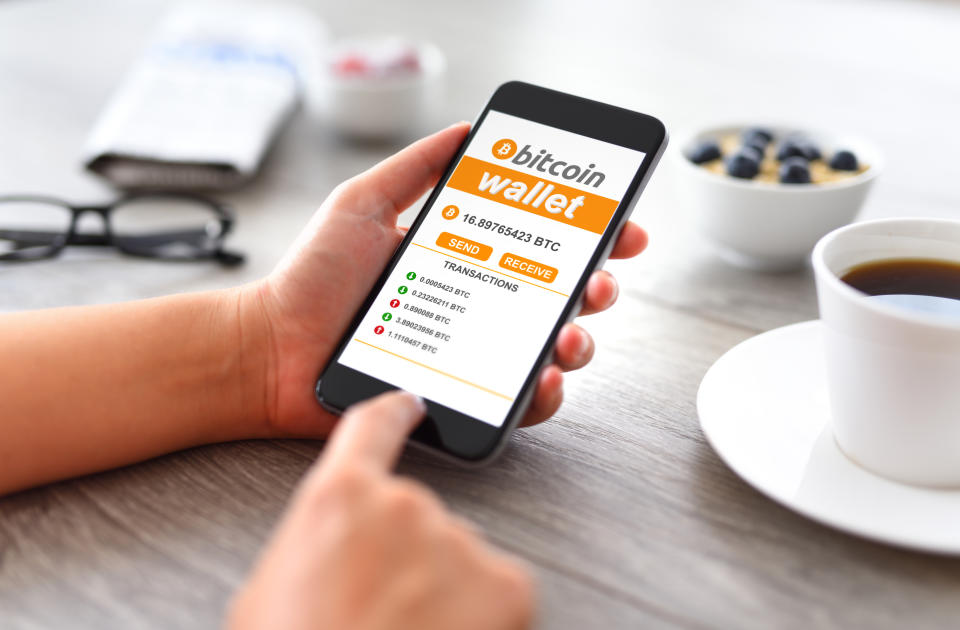What's a digital wallet and how does it work?

Bitcoin, Ethereum and Ripple – oh my! Navigating the world of cryptocurrency can be tricky, but spending and trading it doesn’t need to be.
Digital wallets for cryptocurrency allow people to store the details of their blockchain transactions and assets. And, according to the CEO of CryptoCurve, Josh Halferty, they’re about to become a lot more popular.
Also read: Expert insight: What’s next for Cryptocurrency?
CryptoCurve is a new wallet project designed to make blockchain technology more accessible.
Yahoo Finance spoke with Josh to find out more about digital wallet technology.
This is what we learnt.
Yahoo Finance: What is a digital wallet? How does it work?
Josh Halferty: You can think of a digital wallet as simply a place where digital assets are kept, or accessed. In the case of cryptocurrencies, all the funds are “stored” on the blockchain, and wallet applications interact with the blockchain to allow users to access, send, and trade their funds. These interfaces are what most people think of when they hear the word “wallet”.
YF: How do you choose the best wallet for your needs?
JH: Currently, I place security and the teams behind the wallets of today as paramount among other criterias of selection. Industry-wide security practices are starting to take hold, but blockchain is ever-changing, so it’s important for your wallet provider to stay current with their security design and implementation.
Also read: “Bulls**t”: Atlassian CEO calls out PM’s “fair dinkum power”
The team or company behind the wallet is also important. Is the team still around, or are they working on other projects? How often does the team release updates or support for additional blockchains? These are important things to consider.
YF: What do you need to know about wallet security?
JH: One of the big barriers to entry in my opinion is the use of using cold wallets to store funds.
[Yahoo Finance note: A hot wallet is a wallet connected to the internet, while a cold wallet isn’t. Historically, people have tended to store their cryptocurrency in a cold wallet and use a hot wallet for transactions due to concerns hot wallets weren’t as secure.]
We’ll see great innovation in the hot wallet security over the next few years, that will hopefully make cold wallets unnecessary for people with small to medium sized accounts. I also believe that insurance is coming, sooner rather than later, and that will help consumers peace of mind. There’s no reason not to use a hot wallet if your funds are insured, and this will allow us to bring new functionality inside the wallet itself.
Also read: Woolies’ Q1 food sales hit by bag ban
YF: How many people use them? How is that set to grow?
JH: There are already millions of wallet addresses in use by hundreds of blockchains. In the future, it’s kind of hard to predict because I believe large scale adoption is only just beginning, but it is entirely possible that at least 25-30 per cent of the world’s population will have a digital wallet in the years to come, especially if large retailers and other tech companies jump in, as is anticipated.
YF: What are the costs associated with digital wallets? Will these change over time?
JH: Depending on the supported blockchain, costs are a small fraction of a per cent of the transaction, used to pay the validators for that transaction. I still remember how amazed I was when I saw someone transfer some $30 million worth of cryptocurrency for 9 cents to somewhere else in the world. I knew then that this technology was here to stay.
YF: What are the strengths and weaknesses of our current digital wallets?
JH: I think current wallets do things well for experienced blockchain enthusiasts, but I don’t believe they currently speak to someone inexperienced in the space. That’s a bigger problem though, and hurts most aspects of the industry. Current wallets can store, send, and receive funds just fine, but a large majority of them don’t really do anything else, you have to go to other applications for that. Centralizing the experience is important to me.
YF: What’s coming in the future? How will it change the way we pay for things, save and invest?
JH: In my opinion, in the future you’ll see an increase in interactivity and utility for other blockchain related tasks, like investing or crowdfunding. Storing digital assets in wallets of the future will only be a very small part of their utility. We need to stop thinking of the wallet as a segmented, offline place where funds are kept, and increase application security and insurance offerings to make them safer and more fun to use.
Make your money work with Yahoo Finance’s daily newsletter. Sign up here and stay on top of the latest money, news and tech news.

 Yahoo Finance
Yahoo Finance 
